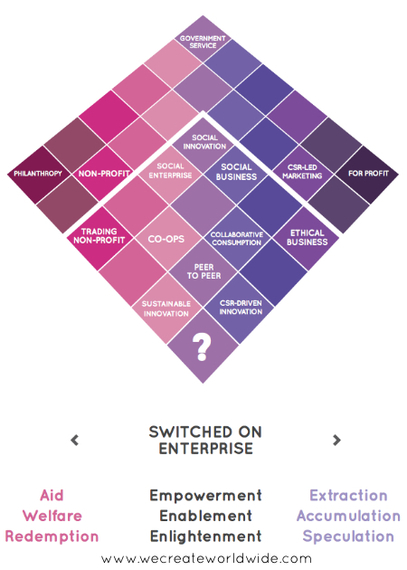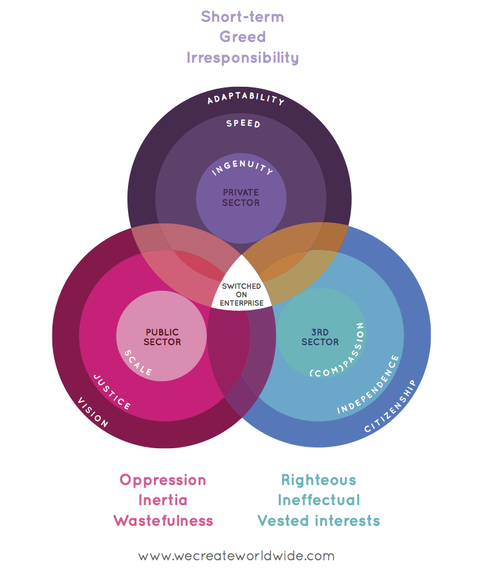As someone who has consulted to scores of the largest corporations on the planet, I believe that the ideology of capitalism -- executed in real-time and in the real-world without values, interconnection and integrity -- is almost always damaging to the social, ecological and spiritual systems it relies on to exist. As I have detailed extensively in a previous post, Economic Growth is Great... Except When It Isn't (And It Isn't A Lot of the Time), unmoored from purpose, business is driving us faster and faster towards suffering.
However, the problems we face are not necessarily best solved through governmental regulation (and the rubric of compliance) or the forced redistribution of wealth. Both stem from ideologies which are resisted by the wealthy and/or conservative.
There is an alternative; a powerful one: To take responsibility -- as business leaders -- for the system we are co-creating and reconfigure it, enterprise by enterprise, by transforming what they can be and mean. We can recalibrate capitalism by building business models whose purpose is to empower, enable and enlighten people (and our planet) to thrive (as well as generate profit for investors and owners). We can use sustainability as a lens for inclusive economic growth. We can leverage our profound human creativity to exploit deep and penetrating insights into how human beings feel, think and do in a way that leads to more people thriving. This is what the switched on enterprise is all about.
Switched on enterprises direct the engines of growth -- powerful forces such as human creativity, risk-taking, perseverance, investment and innovation -- towards the most urgent needs of humanity. They might be called, variously, co-ops, conscious business, B-Corps, Benefit Corporations (US), Community-Interest Companies (UK), social businesses, collaborative companies, social enterprise , or straight forward businesses that are run with heart. Here is the spectrum of switched on enterprises, taken from The Little Book of Breakthrough (available free here):
The leaders of switched on enterprises are consciously reconnecting everything -- from their brand narratives to their supply chains -- to the systems we are (and always have been) part of: The environment, the emotional world of human being and our social systems. Rather than ignore them, we switched on leaders include 'externalities' in our understanding of our performance and the design of our models. We then bring the benefits of innovation to bear on social, environmental and spiritual-emotional problems.
Yet even in this age of massive growth in switched on enterprise, not everyone has got the memo. For example, the British government's main organization for international development, DFID, is using precious resources to fund traditional capitalist enterprises in developing countries, guided by Conservative ministers.
Yet why on this gorgeous Earth would scarce Western aid money be spent investing in a paradigm of business that we, in the West, have found to be so utterly wanting? As Western corporations all over the world scramble to add purpose, meaning, social mission and CSR into their business models, it is patently ludicrous for the British government to be investing hard-earned taxpayers money into businesses that unconsciously drive social inequality, environmental degradation and spiritual poverty.
As as we know from the last three centuries of capitalism, business owners who are not interested in 'externalities' and not conscious of the suffering of others, tend to extract value from the system... rather than invest it in ways that bring more inclusivity, prosperity and 'thrivability' to those who are less fortunate than them. Studies show that the basic drivers of unconscious capitalism -- capitalism that is only interested in growing profit and productivity -- leads to wealth inequality, which Picketty and others suggest tends towards social injustice and social unrest. Such inequality has been called the "defining challenge of our times" (Obama) and "the roots of social ills" (Pope Francis).
Yet when I met representatives from DFID recently and challenged them on this, they had very little to say but the tired memes of Trickle Down Economics. This is ideology over insight. Policy over progress. Assumption over innovation.
What our Western governments could be doing is supporting entrepreneurs and innovators, both at home and overseas, to conceive of, and build, switched on enterprises, as we do with our Impact Accelerator programs (both in large corporations and with start-ups). We work hard to create inclusive economic growth whilst ensuring externalities are brought into the minutiae of decision-making. We purposefully look to alleviate the inequalities at the heart of extractive, accumulative capitalism and balance it with a focus on emotional, cultural and environmental health. We actively cultivate empathy, awareness and compassion, which changes what we feel, think and do as leaders. Our choices come as much from the heart as the head. We try to be less "business-like"; and more human being engaging in the incredible creativity and impact that business allows.
At the core of every switched on enterprise is a business model that no longer measures results through one number alone -- profit. Instead, it builds in three more bottom-lines into quadruple bottom-line accounting:
Profit: Ensuring that our products and services are designed to produce a surplus of money which we can use to justly reward effort, reinvest in more innovation and fund social missions without unnecessary accumulation of wealth.
Planet: Ensuring that the operations of our enterprise both minimise our negative environmental footprint through reducing the use of resources, carbon and energy whilst looking to leave a net positive impact by leaving the environment in a better place than when we found it.
People: Ensuring that we empower employees and customers of all incomes and classes with our brand narratives, enable them with our products, services and processes, and looking to reduce poverty, inequality, suffering and injustice wherever it is appropriate for us to do so.
Purpose: Ensuring that everyone that is involved in our enterprise can bring their whole selves to work, that the culture promotes healing and nurturing, and that our products, services and processes are driven by a whole-hearted, compassionate, ethical and empathic being.
Now, as I know firsthand from my own businesses and consulting/training many others, working with these four dimensions can make business model design, leadership decisions and accounting far more complex and nuanced. Yet there are enough enterprises path-finding their way through the chaos to show it can definitely be done. There is always a win-win-win-win. Yet we may have to give up many cherished notions, assumptions and reflex habits to find it.
We should not let the challenge dissuade us from making every effort to switch on every enterprise we contribute too. The truth is that the complexity has always been there. We have just pretended it was not by focusing on profit, and profit alone. In Business 1.0, we pretended that the challenges were invisible by only thinking in terms of margins, revenues and valuations whilst ignoring colonial suffering, servitude and slavery, the destruction of habitats and species, working-class poverty and the general spiritual malaise of modern life.
We can no longer get away with this gross over-simplification of human experience with Business 2.0 or even 3.0. With all the issues we face, as individuals and as a species, we cannot get away with pretending any longer, judging the complex, rich and systemic impacts of human endeavour with simple, single metrics like profit, productivity and GDP alone.
We need a richer understanding of growth that ensures it is growth that contributes to the world as opposed to growth at the expense of it.
As I explore in my book, Switch On, in time, I hope that all enterprises -- government, for-profit and nonprofit -- will become conscious of their various impacts and purposefully switch on. Each can bring their strengths, but release and surrender their 'shadow', to build switched on enterprises with the power, compassion, integrity, creativity and scale to solve the problems that really matter to us all.
Soon, I hope, we will no longer need the term 'social enterprise', 'conscious business' or 'BCorp' to define them. As someone who runs two switched on enterprises, both of which enable and empower others in different ways, to become switched on, this is certainly a future I am invested in.
This page contains materials from The Huffington Post and/or other third party writers. PricewaterhouseCoopers LLP ("PwC") has not selected or reviewed such third party content and it does not necessarily reflect the views of PwC. PwC does not endorse and is not affiliated with any such third party. The materials are provided for general information purposes only, should not be used as a substitute for consultation with professional advisors, and PwC shall have no liability or responsibility in connection therewith.


